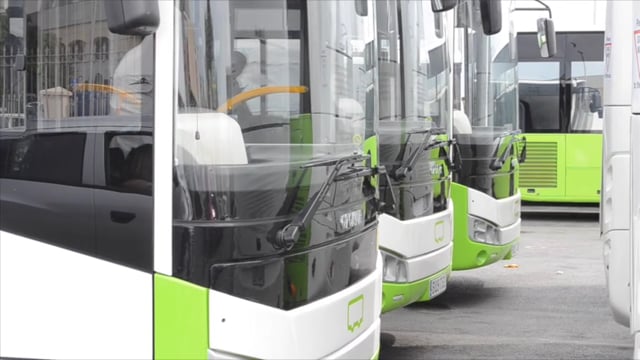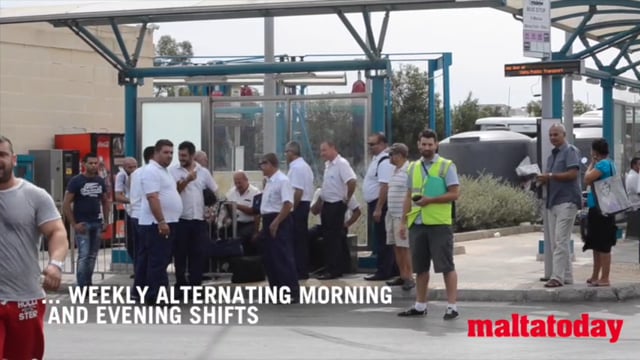Update 5 | Agreement reached on 15-minute breaks for bus drivers
GWU orders bus strike between 4am and 11pm • Malta Public Transport welcomes cour ruling that union should allow 50% of public transport service • Alternattiva Demokratika supports industrial strike
14.png)
13.png)


The General Workers’ Union (GWU) and Malta Public Transport have reached an agreement through which bus drivers will be given 15-minute breaks, one of the main issues that prompted the union to order a bus strike earlier today.
In a brief statement, the Transport Ministry said that agreement was reached following intensive negotiations between the two parties, with the government acting as mediator. The agreement will not in any way diminish the financial package for drivers, as GWU secretary-general Tony Zarb had warned MPT had placed on the table earlier today.
In a statement, the GWU hailed the strike as a “success”. It thanked the government for its mediatory role during the negotiations and the bus drivers for obeying its directives.
Negotiations between the union and the public transport operator will continue in the coming days and will focus on other aspects of a new collective agreement for bus drivers.
A court this afternoon ruled that the GWU’s public transport strike was illegal and insisted that the union should allow 50% of the service, as per a law was introduced in 2012 by former transport minister Austin Gatt.
The decision dismissed claims made by the union that it had a right to bring the bus services to a standstill, and the GWU has since contacted their lawyers on what their next move should be.
Reacting to the court decision, Tony Zarb told a group of striking bus strikers at the Valletta bus terminus that Malta Public Transport’s court application was “below the belt”. He warned that if the union is compelled to allow 50% of the workforce back, “the union will issue new directives" to the drivers on the road.
Zarb added that after an outright refusal of the union’s demands for a 30 minute break for every six hour shift, Malta Public Transport indicated that it would be ready to accept the proposal on condition that the union accepts a diminished financial package for drivers.
"We don't consider five-minute breaks to be adequate," Zarb said, questioning Spanish-owned MPT whether Spanish bus drivers are willing to accept such conditions.
Following an outburst by one of the drivers, Zarb also warned that the GWU will order another strike if the MPT decides to fire a bus driver still on probation who chooses to follow the GWU's directives. "We won't be scared off by the company's court action and we won't stop fighting until bus drivers get what they deserve," he said, calling on MPT to "act like men" and return to the negotiating table.

MPT insist court action intended to safeguard right to public transport
In a press conference, Malta Public Transport claimed that they took the union's strike to court for the sake of the public. "Employees have a fundamental right to strike, but these actions must be done within the context of the law," MPT general manager Konrad Pulé told a press conference.
"Since public transport is such a sensitive service, there has to be a law to limit such strike action and we are satisfied with the court's ruling. We are open for further constructive discussions with the GWU and are willing to find a balance between what is good for the company, what is good for the employees and what is good for the public."
MPT international transport director Julio Tironi insisted that the company remains open to all of the GWU's proposals, but that it couldn't implement their counter-package in only 48 hours, as per the union's ultimatum. He dismissed Zarb's claims that the company would only concede on half-hour breaks in return for a diminished financial package for bus drivers as "having been taken out of context".
"There are several elements to be considered when discussing a complete package," he said. "We offered a complete package, but the union rejected it and offered a completely different one."
The union had ordered the strike after the Spanish-owned public transport operator refused to meet its demands for a minimum 30-minute break every six hours for its workers, an increase in wages, a fixed day off and new shifts as well as written guarantees.
The strike went ahead despite an eleventh-hour mediation attempt by transport minister Joe Mizzi, but following a three-hour meeting no agreement was reached.
This morning the majority of bus drivers obeyed the union’s directives and most of them gathered in Floriana and the Marsa park and ride where the buses are parked. Union boss Tony Zarb this morning confirmed that the "absolute majority" of bus drivers are on strike and only "some 3% or 4%" of the service is functioning.
Despite the strike, traffic flows were no worse than normal as commuters opted for other modes of transport, including the ferry service between Sliema, Valletta and Cospicua.
Yesterday, Zarb said that the GWU ordered all Malta Public Transport employees to follow a directive from 4am to 11pm on Friday. The service will recommence again on Saturday, regardless of the agreement, but the union has warned that other industrial action may follow if an agreement is not reached.
He said that the union had only received an "ambiguous" letter from the company after the union's 48-hour ultimatum, which expires today, and he did not reveal the identity of the sender of the letter.
"The union is open for talks throughout the night but we will only withdraw our directive if an agreement is reached."
Zarb said that the step was a last resort, and that the union had been left with "no alternative" but to order the strike.
Green party supports strike
AD’s spokesperson on transport, energy and infrastructure, Ralph Cassar, said: “Alternattiva Demokratika stands four square behind public transport workers at this point in time. Public transport cannot and should not depend on poor conditions of work. During the past weeks we have all been hearing about the difficult and unacceptable work conditions for public transport employees.
“The lack of proper breaks and the split shift system which management has been insisting on signifies negative effect on these workers' families and their work-life balance. We cannot not notice the low wages, slightly above the minimum wage threshold – which is not enough for any worker, let alone those providing a public service.”













.png)









